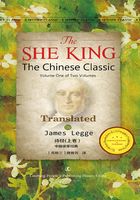
P'EAOU YEW MEI
1 Dropping are the fruits from the plum-tree;
There are [but] seven [tenths] of them left!
For the gentlemen who seek me,
This is the fortunate time!
2 Dropping are the fruits from the plum-tree;
There are [but] three [tenths] of them left!
For the gentlemen who seek me,
Now is the time.

The 2nd=斯所, 'this place'. 違=去, 'to go away from','to leave'. L.4. 遑=暇, 'leisure'. The Urh-ya has 偟,but the oldest reading was simply 皇, in the same sense. Wang T'aou, Wang Yin-che, and many others,take 或 here—有, so that the line=不敢有暇. I prefer,however, the construction of Yen Ts'an:—或者間或之義, 不敢或遑, 則無一時之暇矣. In the other stanzas遑 is used adverbially. L. 5. 振振,—see on i. XI. L. 6.The repetition of 歸哉 is understood to express a wish for the husband's return, but with submission to his absence so long as duty required it.
The rhymes are—in st. 1, 陽, 遑, cat. 10: in 2, 側, 息,cat, 1, t. 3: in 3, 下*, 處, cat. 5, t. 2. In addition to the above, the 1st, 3rd, 5th, and 6th lines of the three stanzas are supposed to rhyme with one another.

3 Dropt are the fruits from the plum-tree;
In my shallow basket I have collected them.
Would the gentlemen who seek me
[Only] speak about it!


